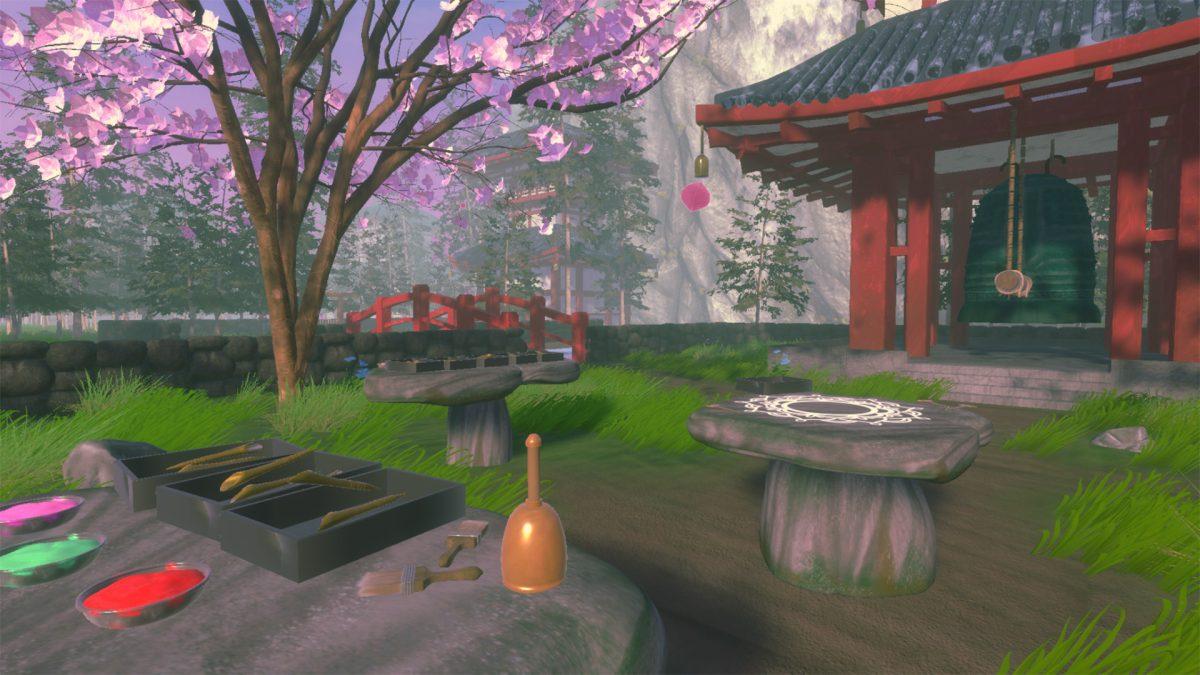
Courtesy of Izzy Daniels
vr game
Art + Design graduate students Izzy Daniels and Mitchell Connor are creating a virtual reality game for children detained at Woodside Learning Center, a correctional facility in San Francisco, titled “Wabi-sabi.”
The idea of a game designed for incarcerated youth developed when Megan Mercurio, an English teacher at Woodside, contacted Art + Design department head Derek Ham about making a VR experience that would be beneficial for her students. Ham presented this opportunity to his ADN 560 students, which is how Daniels and Connor became involved in January 2021.
According to Daniels, the game’s premise is rooted in Asian culture and meditation practices found in Buddhism. The Japanese phrase “wabi-sabi” is a Buddhist aesthetic philosophy rooted in accepting imperfection, impermanence and incompleteness. Daniels and Connor, who are married and have known each other since high school, were inspired by Tibetan monks who visited UNC-Asheville while the two were undergraduate students there.
“[The monks] set up a sand painting in the middle of our student union, and they basically did the same painting for like a week,” Daniels said. “Everyday you could come in and watch them from the balcony as they worked on this. Then they destroyed it, and that was it.”
When Mercurio mentioned during a meeting that her students love Asian culture and wanted to learn more about it, Daniels recalled the monks’ visit and thought the idea of sandpainting could apply to this project.
“I thought, ‘What better way for these students to have a meditative experience?’” Daniels said. “It’s something that can be educational for them as well as peaceful, and it lines up with their interests really well.”
Daniels and Connor continued to build on this idea, adding other meditative activities to the game while also giving students spaces to just sit and relax.
“The process of going through these sand paintings is all about meditation and a calming environment, so that’s kind of what we tried to achieve throughout the entire experience,” Connor said. “There’s other meditative experiences in there and that’s something that we’re also trying to flesh out before we give this to the kids. There’s a rock stacking garden, there’s a koi pond, there’s a zen garden where you can rake sand and make those concentric circles… There’s other little bits and pieces to the experience, but overall, it’s about achieving this sort of meditative state.”
Daniels added onto Connor’s point and emphasized the idea of “active non-participation.”
“They also have the option to literally just sit in a rock garden and just watch the leaves or the cherry blossom trees blow, or they could just sit by the river and listen to the river and look at the mountains,” Daniels said. “If that’s what they want to do with their 20 minutes of meditative time, then they are welcome to do that. I think that’s something we really wanted to be sure the students were able to embrace, especially since they’re in such tough situations. Children in correctional facilities don’t get their own space and their own time, so to be able to have that 20 minutes of meditative time to do whatever, I think that was really important.”
Connor also credits the game with giving him inspiration for his thesis project, which is focused on how VR can help people with Alzheimer’s disease.
“This project has kind of been a new spark into how I create,” Connor said. “I really like this idea of creating for other people to help them. I mean, it’s more than just about entertaining at this point. It’s about giving them something that they can benefit from. … So I’m currently looking into how VR can help trigger memories, kind of looking into how art in itself can help benefit people rather than just entertain because I think there’s something behind that that needs to be explored.”
Daniels and Connor hope to finish “Wabi-sabi” over winter break and present it to the students at Woodside. They also hope to eventually release it to the general public so anyone can use it.